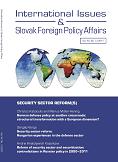Security sector reform: Hungarian experiences in the defense sector
Security sector reform: Hungarian experiences in the defense sector
Author(s): Gergely VargaSubject(s): Politics / Political Sciences
Published by: Research Center of the Slovak Foreign Policy Association (RC SFPA)
Keywords: Hungary; security sector reform; armed forces
Summary/Abstract: Transforming a country’s security system is a never-ending task, with each nation trying to adapt to the ever-changing internal and external security challenges. Security sector reform can be a struggle in war-torn countries and failed states, such as Afghanistan or Iraq, but neither is it a simple process in countries going through major peaceful transformation of the political–economic system. In the last two decades, the countries of Central and Eastern Europe, including Hungary, found this out the hard way. This article takes a look at the Hungarian experience on security system reform, focusing on the defense sector. After the collapse of the Warsaw Pact, NATO accession and integration into the Western military alliance were the main driving force for the defense policy of Hungary, which had just regained its freedom from Soviet rule. This was a highly important and useful strategic objective and was an incentive for reform, but it was not enough to prompt the comprehensive, deep transformation and modernization of Hungary’s military capabilities. As we show in this article, the lack of a long-term predictable strategy and political attention, decreasing resources and slow structural changes were key features in the challenge of reforming Hungarian defense.
Journal: International Issues & Slovak Foreign Policy Affairs
- Issue Year: XX/2011
- Issue No: 03
- Page Range: 29-42
- Page Count: 14
- Language: English

